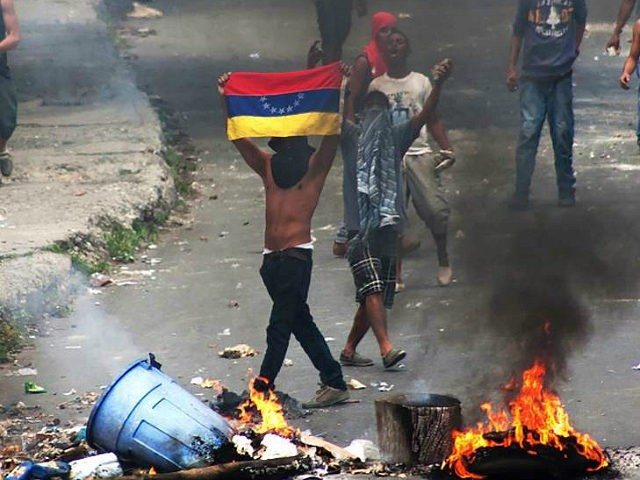An Associated Press (AP) “explainer” on the wave of protests in Venezuela this month omits the socialist government’s refusal to free prisoners of conscience, the rampant use of police brutality, and human rights violations against protesters in an attempt to explain the “economic” unrest in the nation.
The story, titled “AP Explains: Why Are Protests Rocking Venezuela Now?” does not mention prisoners of conscience, and only mentions military use of “heavy force” as a possibility, not a certainty. By Thursday, when the post was published, Venezuelan authorities had used so much tear gas that they asphyxiated an 87-year-old woman in her home in Caracas.
Instead, the AP report focuses on two factors it claims are behind the current protests: the Supreme Court’s attempt to replace the National Assembly as the country’s federal legislative body and the “economic crisis,” which it blames on global oil prices.
In addressing the former as a factor in growing protests, the AP is correct. However, the report claims that the Supreme Court backed down from that decision because dictator Nicolás Maduro “later asked the court to,” and it claims the move “unleashed long-simmering anger amid an economic crisis that has a majority of Venezuelans skipping meals and even losing weight.”
That economic crisis, the AP argues, is the product of global economic factors. “Oil accounts for 96 percent of Venezuela’s export earnings and the plunge in world oil prices hit the government hard, leaving it owing money across the board, from foreign airlines to oil service companies,” the article claims. Nowhere does the piece note the nearly 20 years of socialist rule that have seen the use of strict price controls to limit foreign investment, the implementation of a ration system that has left supermarkets with bare shelves, or the deep corruption within the military that has resulted in tons of food rotting in Venezuela’s harbors when shippers refuse to pay bribes.
Not only does the report fail to properly explain the economic reasons for the unrest, it omits the political reasons entirely. Venezuela is home to dozens of political prisoners, many opposition leaders deemed too powerful or charismatic to remain free. Among them is Leopoldo López, the head of the opposition Popular Will party, sentenced to 14 years in prison for organizing peaceful protests; Antonio Ledezma, the mayor of Caracas, swept out of his office “like a dog” for supporting the opposition; and Daniel Ceballos, mayor of western San Cristóbal, an anti-socialist stronghold. Among those still free, the government has banned especially effective opposition leaders from the National Assembly, attacked them with tear gas, and – most recently – banned a former presidential candidate from public office for fifteen years without cause.
The AP notes that Venezuela is violent – Caracas the most violent peacetime city in the world – and that fears of violence during the protests are merited because of “the huge number of firearms circulating on the streets.” Once again, the AP sins by omission. Absent from this assessment is the fact that Venezuela banned the private ownership of firearms under dictator Hugo Chávez for anyone who was not part of socialist “militias” approved by the government to intimidate dissidents. The wide dissemination of firearms on the streets of Caracas occurs only among criminals – even prison inmates boast heavy weapons – but law-abiding civilians seeking to protect themselves from criminals have no legal recourse to arm themselves. The AP phrases the problem as if everyone in Caracas is armed when, in reality, only socialists and criminals have access to guns.
The AP also offers a harsh criticism of the opposition, claiming it is “divided by some big egos and has had a tough time connecting with poor people who still revere the late Hugo Chavez.” The explainer offers no examples of “big egos” hurting the opposition’s organization or of poor people still connecting with socialists. It also notably fails to mention the true major problem with the opposition: its leadership is socialist too.
The report additionally claims that unspecified “polls” show Maduro is still popular with 20 percent of the country, while not mentioning the revolts against Maduro in socialist strongholds nor calls from socialist leaders to oust Maduro as a way to “save the revolution.”
With the fast pace of the American news cycle and deluge of information in news outlets and social media, the instinct to prepare a digestible article for those curious about Venezuela but without the time to study it deeply is commendable on the AP’s part. But its biased, barely informative approach in this explainer does a disservice to both its readers and the Venezuelan people, many whom have given their lives for more than an expression of economic frustration.

COMMENTS
Please let us know if you're having issues with commenting.